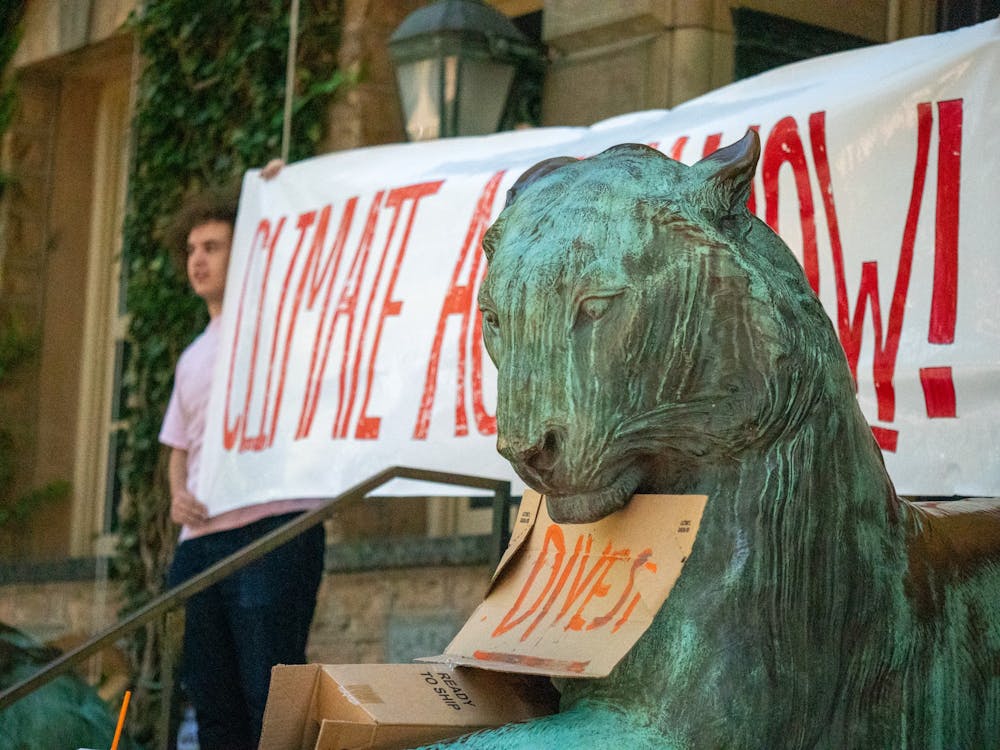Nearly a year ago, more than 80 percent of Princeton student voters backed a referendum calling on the University to divest and dissociate its billions-rich endowment from fossil fuel companies.
Sadly, too little has changed since then. As peer institutions (including Oxford, Harvard, Rutgers, and Dartmouth) have moved towards divestment, Princeton has dragged its heels.
This board now echoes the calls of the student body, calling upon the University to move towards fossil fuel divestment with haste.
We understand that dissociation is not a step that the University takes lightly, reserving the measure for “a company’s behavior conflicts substantially with the central values of the University.” But in the view of this board, that criteria has been clearly met.
By failing to curb carbon emissions despite a clear scientific consensus, and exacerbating the climate crisis, fossil fuel companies’ actions are directly out of line with the University’s values and truth-seeking mission as a research institution. By failing to divest from the industry, the University essentially applauds its researchers’ contributions to the world’s understanding of climate change in one breath and funds companies ignoring the science in the next. We cannot claim to serve the nation and humanity if we profit off of companies while disregarding their harmful impacts on society. We cannot claim to prioritize addressing systemic racism when those impacts disproportionately harm communities of color.
This is not just apparent to us. It was clear to the University committee that deliberated this issue for a year following Divest Princeton’s initial dissociation proposal. Based on input from a variety of campus stakeholders, the Council of the Princeton University Community (CPUC) Resources Committee drafted a series of recommendations last May. Specifically, the group called upon the University to:
- divest from the thermal coal and tar sands industries;
- divest from companies that spread climate disinformation;
- conditionally dissociate from fossil fuel businesses that have not undertaken an acceptable path to achieve carbon neutrality, as guided by scientific recommendations.
This final point was crucial. In the Resources Committee’s own words, “If we must be tied to fossil fuels, albeit at a decreasing rate, we are better off being tied to companies that share the goal of decarbonization and demonstrate progress towards those goals.”

In response to the report, the Board of Trustees announced that they would divest and disassociate from the thermal coal and tar sands and companies actively spreading misinformation. But despite describing their plans as “more aggressive” than the Resources Committee recommendations, the Trustees seemingly ignored the third Resources Committee recommendation.
These already-insufficient plans and actions have been walked back even further this fall, with a newly-installed faculty panel now exploring standards to inform the Trustees’ implementation of a merely conditional divestment from thermal coal and tar sands.
Earlier this month, student activists from Divest Princeton protested at the most recent CPUC meeting. They demanded more urgent action from the University in its dissociation from fossil fuels, as well as student representation on the faculty panel studying dissociation metrics, principles, and standards. We echo both of these calls.
While this Board appreciates faculty expertise guiding the divestment process, we hold that the presence of student leaders would only serve to further enrich their work. Young people will bear the brunt of the climate crisis; young people have pushed this institution, and the world more generally, to understand and combat the crisis; and young people deserve a seat at the table.

But no matter who is represented on the faculty panel, a larger issue remains. The panel is being asked the wrong set of narrow questions. We should not solely be interested in what “an appropriate rigorous standard or target for greenhouse gas emissions” looks like for companies within thermal coal or tar sands sectors. Instead — as the Resources Committee emphasized — we should be asking the industry at large to recognize how critical climate change is and commit to being on the right side of this issue.
Between the examples of peer institutions, the energy of student activists, and the expertise assembled on the faculty panel, the University is more than able to establish suitable and stringent criteria for dissociation in line with its values. It’s high time for the Trustees to act.
145th Editorial Board
Chair
Zachariah Sippy ’23
Members
Shannon Chaffers ’22
Won-Jae Chang ’24
Kristal Grant ’24
Harsimran Makkad ’22
AG McGee ’22
Collin Riggins ’24
Zachary Shevin ’22
Mollika Jai Singh ’24








